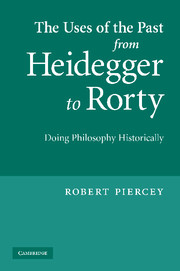Book contents
- Frontmatter
- Contents
- Acknowledgments
- List of abbreviations
- Introduction: The uses of the past
- 1 Doing philosophy historically
- 2 The role of narrative
- 3 Defending the historical thesis
- 4 The critical approach: MacIntyre
- 5 The diagnostic approach: Heidegger
- 6 The synthetic approach: Ricoeur
- Consequences
- References
- Index
Introduction: The uses of the past
Published online by Cambridge University Press: 31 August 2009
- Frontmatter
- Contents
- Acknowledgments
- List of abbreviations
- Introduction: The uses of the past
- 1 Doing philosophy historically
- 2 The role of narrative
- 3 Defending the historical thesis
- 4 The critical approach: MacIntyre
- 5 The diagnostic approach: Heidegger
- 6 The synthetic approach: Ricoeur
- Consequences
- References
- Index
Summary
Quine is said to have joked that “there are two sorts of people interested in philosophy, those interested in philosophy and those interested in the history of philosophy.” Though we might bristle at Quine's joke, it makes a straightforward point: that there is a difference between trying to solve contemporary philosophical problems and trying to understand the philosophers of the past. Doing philosophy and studying its history are separate enterprises, and they must be carefully distinguished. During the last several decades, however, doing so has become more difficult, as it has become common for philosophers to speak of a third enterprise that must be distinguished both from doing philosophy and from studying its history. This enterprise is called doing philosophy historically. Doing philosophy historically involves more than just doing philosophy, since not every attempt to solve philosophical problems does so by engaging with thinkers from the past. We can try to solve philosophical problems in non-historical ways – through conceptual analysis or the study of ordinary language, for example. Doing philosophy historically also involves more than simply studying the history of philosophy, since not every attempt to understand the thinkers of the past is also an attempt to solve contemporary philosophical problems. We can try to understand what Aristotle or Aquinas said without asking whether what they said is true, rational, or relevant to our own concerns. Doing philosophy historically is a hybrid: an attempt to gain philosophical understanding through or by means of an engagement with philosophy's past.
- Type
- Chapter
- Information
- The Uses of the Past from Heidegger to RortyDoing Philosophy Historically, pp. 1 - 8Publisher: Cambridge University PressPrint publication year: 2009



